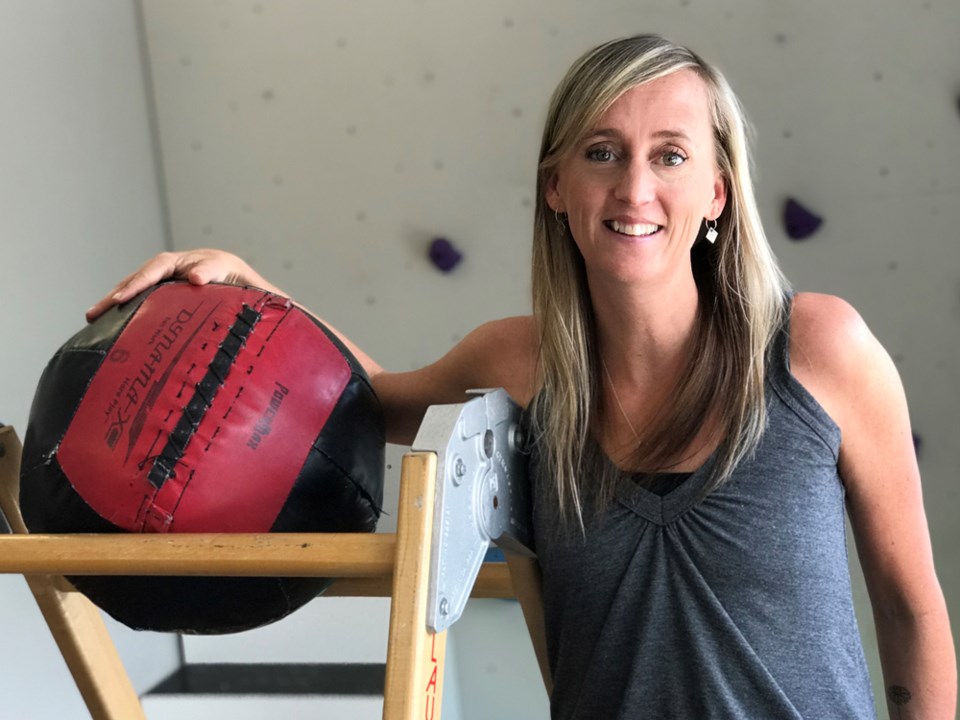When Tara Cain’s clients are climbing the walls, she knows she’s doing something right. As an occupational therapist and owner of Play In Motion – the Sea to Sky Corridor’s first and only privately run multidisciplinary paediatric therapy clinic – getting kids to play is the name of the game.
With youngsters, occupational therapy can be a bit of a misnomer – one that can lead to confusion amongst parents, and even educators, she says.
“When we are talking about kids, and that’s our entire clientele, the term occupational therapy is a little misleading because everyone thinks, ‘Well, these kids don’t work,’ but the occupation of a child is to play,” said Cain, adding the clinic services hundreds of children 18 and under, both short and long term.
Indeed the “office” looks more like a jungle gym with colourful padded mats, climbing holds affixed to the wall, hanging swings and ladders, and sensory toys.
“I like to say we play with a purpose,” she said with a broad smile.
Cain was inspired to step outside her therapist role and into that of a businesswoman when she realized the large number of children in the Sea to Sky Corridor who were in need of specialized paediatric services like hers.
Play In Motion got its start in 2015 as a small, one-room business Cain outfitted with the tools and toys she needed to help her growing roster of young clients more fully.
But as word got out, she quickly became too busy to meet all their needs and when a much larger space just a few blocks away opened up, she jumped on it.
The multidisciplinary aspect of Cain’s clinic is what really sets it apart.
She houses two other OTs, a physiotherapist and two speech and language pathologists.
“Being under the same rooms allows us to work in the best way possible. Most of us work a lot with the same children, and we can communicate about progress, challenges and goals without having to set up a lot of formal meetings and find times to meet outside of the practice with other therapists,” she said.
“Here we can do it around the water cooler.”
Many therapists will combine goals in a session.
For example, Cain said, when she’s working with a child for OT she will incorporate speech or gross motor skills development when appropriate.
“It’s great to be able to get some tidbits from the actual speech therapist who will tell me: Say or do this, or expect this from this child. And I can say, ‘While you’re working on speech do this activity with them as well.’
“We have a lot of opportunities to talk, which is the best thing about having us all under one roof – it’s the best thing for our clients. Ultimately, the children able to move through the therapies with more ease – they’re able to reach their goals faster.”
Cain, herself a mother of two, has been working with children with varying disabilities, diagnosis, and challenges since high school.
She said watching children reach their potential is what makes it all worth it.
“I love watching these kiddos reach their goals, knowing how much harder it is for them to reach their goals compared with a neurotypical child how much harder they have to work to reach those goals – the motivation and drive and perseverance that these kids have to reach these goals is awesome. Seeing them successfully do things for the first time, the joy they have after they’ve worked so hard, is incredible,” she said, adding that with therapy she’s seen some children far surpass the diagnosis they were given at a very young age.
“We work a lot with kids with autism or cerebral palsy or trisomy 21 – kids with a diagnosis, but I also do a lot of work with neurotypical children who are just struggling with some of them are fine motor tasks like printing.
“In eight to 16 sessions we can do an intensive printing program to get them on the right track and send them on their way. People can always self refer.”
For now, this is the only multidisciplinary clinic of its type in the Corridor, but if Cain has her way one day she hopes to open a smaller version in Pemberton to service communities north of Squamish, so families don’t have to travel such great distances for therapy sessions.



